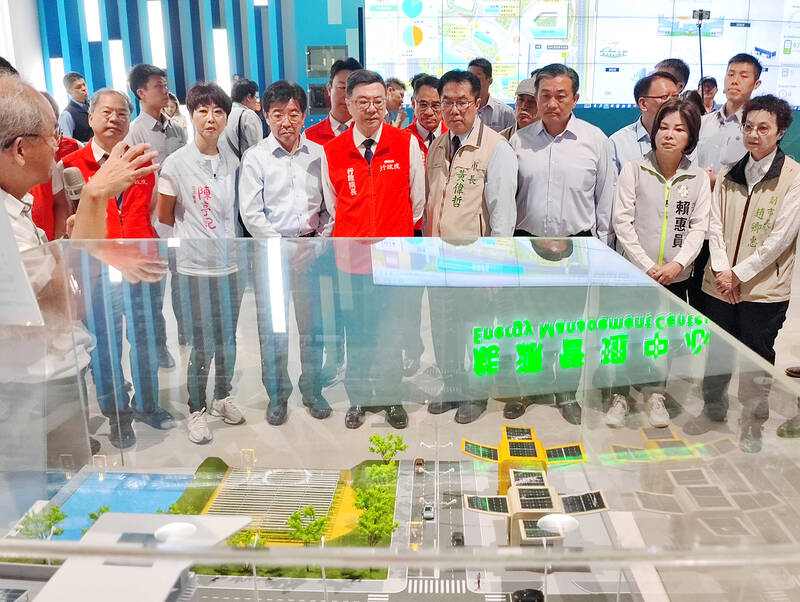A new artificial intelligence (AI) industrial park to be built in Tainan would be at the foundation of Taiwan’s development of AI as an industry and its application to other sectors, Premier Cho Jung-tai (卓榮泰) said on Saturday.
During a visit to Tainan, Cho toured the site of the Shalun Smart Green Energy Science City project and said the first two parts of the project that are built — the CyberSecurity and Smart Technology R&D Building, and the Shalun Green Energy Technology Demonstration Site — represent the starting point for the science city’s AI development.
The new AI park is to extend out from those two areas, he said.

Photo: Wu Chun-feng, Taipei Times
The National Science Technology Council one of the agencies overseeing the park, said it would house data centers, and other sections are planned for zero-carbon technologies, quantum science, smart agriculture, smart transportation and smart medicine.
Cho said the park was being established to carry out President William Lai’s (賴清德) policy of supporting “Five Trusted Industry Sectors” — semiconductors, AI, defense, security and surveillance, and next-generation communications.
Major tech companies such as Nvidia and AMD have plans to further their bases in Taiwan, and the government has the responsibility to provide good infrastructure to facilitate their investment, he said.
The industrial park would be another base connecting with northern Kaohsiung to form a “southern smart corridor,” he said.
Northern Kaohsiung is emerging as a site for high-tech parks, including the Northern Kaohsiung Industrial Park project that broke ground last year, and the Ciaotou Science Park aimed at attracting semiconductor, smart machinery, and space-related companies.
Also sprouting up is the Nanzih Technology Industrial Park, where Taiwan Semiconductor Manufacturing Co is building a fab that would produce advanced 2-nanometer wafers.
Council head Wu Cheng-wen (吳誠文) said his agency would accelerate the building of data centers and work with top international enterprises to turn Shalun into an AI R&D stronghold in the Asia-Pacific region.
Tainan Mayor Huang Wei-che (黃偉哲) said the AI park could benefit from the presence of AI research institutes at National Cheng Kung University and National Yang Ming Chiao Tung University’s Tainan Campus and would also eventually benefit other southern cities.

US climber Alex Honnold is to attempt to scale Taipei 101 without a rope and harness in a live Netflix special on Jan. 24, the streaming platform announced on Wednesday. Accounting for the time difference, the two-hour broadcast of Honnold’s climb, called Skyscraper Live, is to air on Jan. 23 in the US, Netflix said in a statement. Honnold, 40, was the first person ever to free solo climb the 900m El Capitan rock formation in Yosemite National Park — a feat that was recorded and later made into the 2018 documentary film Free Solo. Netflix previewed Skyscraper Live in October, after videos

NUMBERS IMBALANCE: More than 4 million Taiwanese have visited China this year, while only about half a million Chinese have visited here Beijing has yet to respond to Taiwan’s requests for negotiation over matters related to the recovery of cross-strait tourism, the Tourism Administration said yesterday. Taiwan’s tourism authority issued the statement after Chinese-language daily the China Times reported yesterday that the government’s policy of banning group tours to China does not stop Taiwanese from visiting the country. As of October, more than 4.2 million had traveled to China this year, exceeding last year. Beijing estimated the number of Taiwanese tourists in China could reach 4.5 million this year. By contrast, only 500,000 Chinese tourists are expected in Taiwan, the report said. The report

Temperatures are forecast to drop steadily as a continental cold air mass moves across Taiwan, with some areas also likely to see heavy rainfall, the Central Weather Administration (CWA) said. From today through early tomorrow, a cold air mass would keep temperatures low across central and northern Taiwan, and the eastern half of Taiwan proper, with isolated brief showers forecast along Keelung’s north coast, Taipei and New Taipei City’s mountainous areas and eastern Taiwan, it said. Lows of 11°C to 15°C are forecast in central and northern Taiwan, Yilan County, and the outlying Kinmen and Lienchiang (Matsu) counties, and 14°C to 17°C

STEERING FAILURE: The first boat of its class is experiencing teething issues as it readies for acceptance by the navy, according to a recent story about rudder failure The Hai Kun (海鯤), the nation’s first locally built submarine, allegedly suffered a total failure of stern hydraulic systems during the second round of sea acceptance trials on June 26, and sailors were forced to manually operate the X-rudder to turn the submarine and return to port, news Web site Mirror Daily reported yesterday. The report said that tugboats following the Hai Kun assisted the submarine in avoiding collisions with other ships due to the X-rudder malfunctioning. At the time of the report, the submarine had completed its trials and was scheduled to begin diving and surfacing tests in shallow areas. The X-rudder,